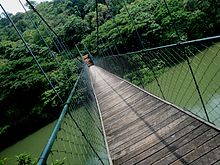Terminology and history

A hanging bridge in ecotourism area of Thenmala, Kerala in India – India’s first planned ecotourism destination
Ecotourism is a late 20th-century neologism compounded from eco- and tourism. According to the Oxford English Dictionary, ecotour was first recorded in 1973 and ecotourism, “probably after ecotour“, in 1982.
- ecotour, n. … A tour of or visit to an area of ecological interest, usually with an educational element; (in later use also) a similar tour or visit designed to have as little detrimental effect on the ecology as possible or undertaken with the specific aim of helping conservation efforts.
- ecotourism, n. … Tourism to areas of ecological interest (typically exotic and often threatened natural environments), esp. to support conservation efforts and observe wildlife; spec. access to an endangered environment controlled so as to have the least possible adverse effect.
Some sources suggest the terms were used nearly a decade earlier. Claus-Dieter (Nick) Hetzer, an academic and adventurer from Forum International in Berkeley, CA, coined ecotourism in 1965, according to the Contra Costa Times, and ran the first ecotours in the Yucatán during the early 1970s.
The definition of ecotourism adopted by Ecotourism Australia is: “Ecotourism is ecologically sustainable tourism with a primary focus on experiencing natural areas that fosters environmental and cultural understanding, appreciation and conservation.”
The Global Ecotourism Network (GEN) defines ecotourism as “responsible travel to natural areas that conserves the environment, sustains the well-being of the local people, and creates knowledge and understanding through interpretation and education of all involved (visitors, staff and the visited)”.
Ecotourism is often misinterpreted as any form of tourism that involves nature (see jungle tourism). Self-proclaimed practitioners and hosts of ecotourism experiences assume it is achieved by simply creating destinations in natural areas. According to critics of this commonplace and assumptive practice, true ecotourism must, above all, sensitize people to the beauty and the fragility of nature. These critics condemn some operators as greenwashing their operations: using the labels of “green” and “eco-friendly”, while behaving in environmentally irresponsible ways.
Although academics disagree about who can be classified as an ecotourist and there is little statistical data, some estimate that more than five million ecotourists—the majority of the ecotourist population—come from the United States, with many others from Western Europe, Canada and Australia.
Currently, there are various moves to create national and international ecotourism certification programs. National ecotourism certification programs have been put in place in countries such as Costa Rica, Australia, Kenya, Estonia, and Sweden. # ISO certtification in India
Related terms
Sustainable tourism
This section is an excerpt from Sustainable tourism.
A Canopy Walkway at Kakum National Park in Ghana, ensuring that tourists have least direct impact on the surrounding ecology. The visitor park received the Global Tourism for Tomorrow Award the following year.
Sustainable tourism is a concept that covers the complete tourism experience, including concern for economic, social and environmental issues as well as attention to improving tourists’ experiences and addressing the needs of host communities. Sustainable tourism should embrace concerns for environmental protection, social equity, and the quality of life, cultural diversity, and a dynamic, viable economy delivering jobs and prosperity for all. It has its roots in sustainable development and there can be some confusion as to what “sustainable tourism” means 23 There is now broad consensus that tourism should be sustainable. In fact, all forms of tourism have the potential to be sustainable if planned, developed and managed properly.Tourist development organizations are promoting sustainable tourism practices in order to mitigate negative effects caused by the growing impact of tourism, for example its environmental impacts.The United Nations World Tourism Organization emphasized these practices by promoting sustainable tourism as part of the Sustainable Development Goals, through programs like the International Year for Sustainable Tourism for Development in 2017. There is a direct link between sustainable tourism and several of the 17 Sustainable Development Goals (SDGs).: 26 Tourism for SDGs focuses on how SDG (“decent work and economic growth”), SDG 12 (“responsible consumption and production”) and SDG 14 (“life below water”) implicate tourism in creating a sustainable economy. According to the World Travel & Tourism Travel, tourism constituted “10.3 percent to the global gross domestic product, with international tourist arrivals hitting 1.5 billion marks (a growth of 3.5 percent) in 2019” and generated $1.7 trillion export earnings yet, improvements are expected to be gained from suitable management aspects and including sustainable tourism as part of a broader sustainable development strategy # ISO certtification in India